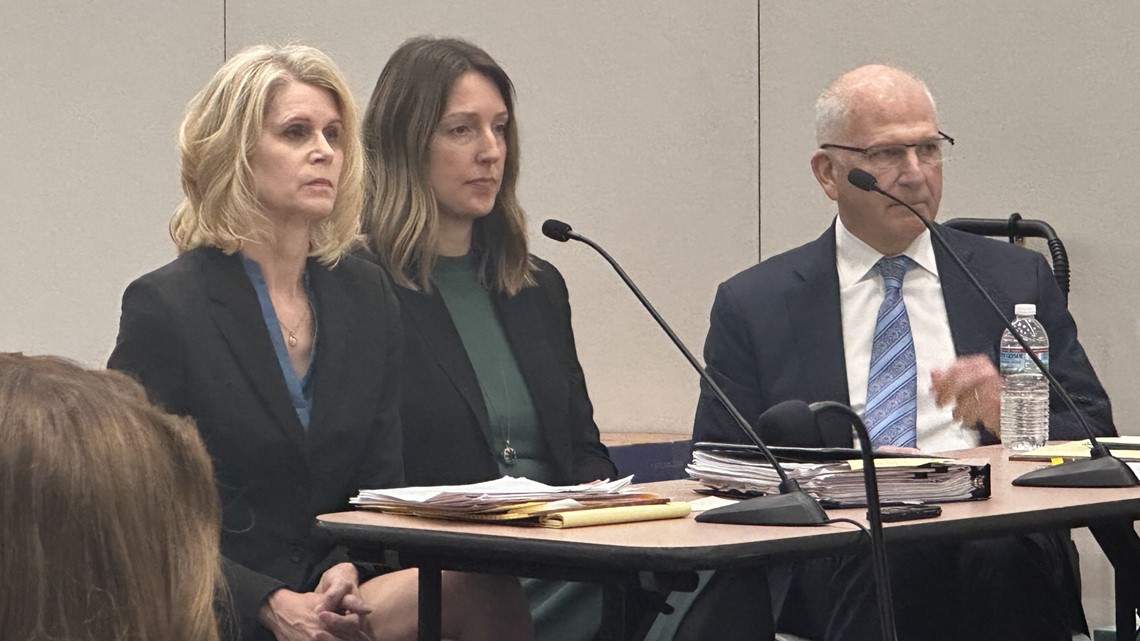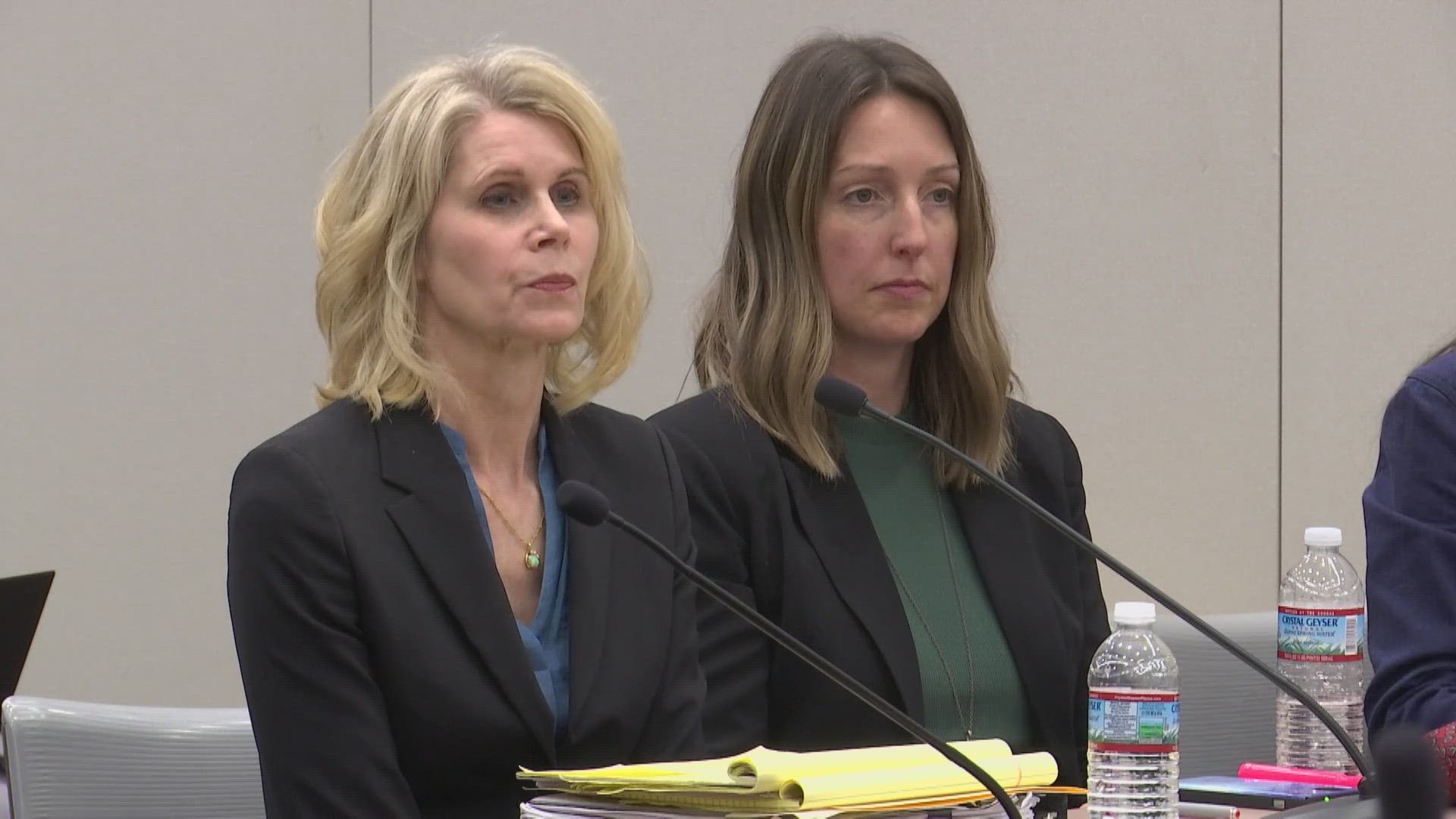INDIANAPOLIS — An Indiana doctor will receive a letter of reprimand and have to pay a $3,000 fine following the Indiana State Medical Licensing Board's vote, finding Dr. Caitlin Bernard violated patient privacy under HIPAA and state law when she spoke out about a young rape victim who needed an abortion.
The board did not find that the state met its burden on reporting child abuse and fitness to practice.
Bernard was not suspended or put on probation by the board, meaning Thursday's decision will not impact her ability to practice or work with patients in Indiana.
"I think it's incredibly unfortunate as the intimidation of Dr. Bernard sends a message that this can happen to any physician that's providing comprehensive evidence-based healthcare to their patients," said Dr. Tracey Wilkinson, assistant professor of pediatrics at the IU School of Medicine.
Attorney General Todd Rokita's office released the following statement after the board's decision was announced:
"Like we have said for a year, this case was about patient privacy and the trust between the doctor and patient that was broken. What if it was your child or your parent or your sibling who was going through a sensitive medical crisis, and the doctor, who you thought was on your side, ran to the press for political reasons? It’s not right, and the facts we presented today made that clear. We appreciate the Medical Licensing Board’s extraordinary time and consideration. My team did a great job getting the Truth out. Caitlin Bernard was found liable for violating state and federal patient privacy law on three separate counts."
The board will issue its final orders and conclusions of law sometime in the next 90 days. After that order, Bernard's attorneys will have 30 days to appeal.
IU Health released a statement regarding the situation around Dr. Bernard and said they did believe she was compliant with privacy laws stating:
"We appreciate the Medical Licensing Board’s time dedicated to understanding the issues involving our colleague Dr. Caitlin Bernard. We are pleased she will continue to be a member of our medical team and provide compassionate care to her patients. We do not agree with the Board’s decision regarding patient privacy regulations and stand by the HIPAA risk assessment. We believe Dr. Bernard was compliant with privacy laws."
Planned Parenthood issued the following response:
“The fight to do what’s right isn’t easy. Dr. Bernard has repeatedly placed her profession, her reputation, and her livelihood on the line in her efforts to advance public health and serve her community. It is an honor to work with and support providers like Dr. Bernard—who are committed to care no matter what.
Dr. Bernard’s unwavering dedication to her patients and profession is laudable, but the lengths she was forced to go to continue to deliver safe and legal care while experiencing abusive and hostile conditions is unacceptable. This could have all been avoided had Indiana AG Todd Rokita not made a mockery of his office–no provider should ever have to face politically motivated attacks simply for doing their job.
Every person, in every circumstance, deserves access to health care when and where they need it. Dr. Bernard is an example of what it takes to make this basic human right a reality.”
Bernard has consistently defended her actions, and she told the board on Thursday that she followed Indiana’s reporting requirements and hospital policy by notifying hospital social workers about the child abuse — and that the girl’s rape was already being investigated by Ohio authorities. Bernard's lawyers also said that she didn’t release any identifying information about the girl that would break privacy laws.


The girl’s case sparked a national political uproar in the weeks after last summer's Roe v. Wade decision put into effect an Ohio law that prohibited abortions after six weeks of pregnancy. Some news outlets and Republican politicians falsely suggested Bernard fabricated the story, until a 27-year-old man was charged with the rape in Columbus, Ohio. During an event at the White House, President Joe Biden nearly shouted his outrage over the case.
Rokita’s complaint asked the licensing board to impose “appropriate disciplinary action” but doesn’t specify a requested penalty.
Medical board President Dr. John Strobel said he believed Bernard went too far in telling a reporter about the girl's pending abortion and that physicians need to be careful about observing patient privacy.
“I don’t think she expected this to go viral," Strobel said of Bernard. "I don’t think she expected this attention to be brought to this patient. It did. It happened.”
Bernard's lawyer Alice Morical told the board Thursday that the doctor reported child abuse of patients many times a year and that a hospital social worker had confirmed with Ohio child protection staffers that it was safe for the girl to leave with her mother.
“Dr. Bernard could not have anticipated the atypical and intense scrutiny that this story received,” Morical said. “She did not expect that politicians would say that she made the story up.”
Amid the wave of attention to the girl’s case last summer, Rokita, who is stridently anti-abortion, told Fox News he would investigate Bernard’s actions and called her an “abortion activist acting as a doctor.”
Deputy Attorney General Cory Voight argued Thursday that the board needed to address what he called an “egregious violation” of patient privacy and Bernard’s failure to notify Indiana’s Department of Child Services and police about the rape.
“There’s been no case like this before the board,” Voight said. "No physician has been as brazen in pursuit of their own agenda.”
Voight asked Bernard why she discussed the Ohio girl’s case with a newspaper reporter and later in other news media interviews rather than using a hypothetical situation.
“I think that it’s incredibly important for people to understand the real-world impacts of the laws of this country about abortion,” Bernard said. “I think it’s important for people to know what patients will have to go through because of legislation that is being passed, and a hypothetical does not make that impact."
Board member Dr. Bharat Barai opposed finding that Bernard violated privacy laws, saying that she released no direct protected identifying information such as the girl’s name or address. He disagreed with the board majority’s view that the combination of information about the rare instance of a pregnant 10-year-old girl could have exposed her identity.
“We are trying to suppose that yeah this could have been done and maybe somebody could have discovered it,” Barai said.
During Thursday's hearing lasting some 13 hours, Rokita’s office kept up a running commentary on its official Twitter account, with one post saying: “When Bernard talked about the high priority she puts on legislation and speaking to the public, she did so at the expense of her own patient. This shows where her priorities are as an activist rather than a doctor.”
Bernard objected to Voight, saying her choice to publicly discuss the case led to the misconduct allegations.
“I think if the attorney general, Todd Rokita, had not chosen to make this his political stunt, we wouldn’t be here today,” Bernard said.
Lawyers for the attorney general’s office repeatedly raised questions about whether the policy of Bernard’s employer, Indiana University Health, to report suspected child abuse to authorities in the state where the abuse occurred complied with Indiana law. Officials of IU Health, which is the state’s largest hospital system, testified that the Indiana Department of Child Services has never objected to the hospital policy.
The Indiana board — with five doctors and one attorney present who were appointed or reappointed by Republican Gov. Eric Holcomb — had wide latitude under state law allowing it to issue reprimand letters or suspend, revoke or place on probation a doctor’s license.
Ohio’s law imposing a near-ban on abortion was in effect for about two months, before being put on hold as a lawsuit against it plays out. Indiana’s Republican-dominated Legislature approved a statewide abortion ban weeks after the Ohio girl’s case drew attention, but abortions have continued to be permitted in the state while awaiting an Indiana Supreme Court decision on the ban’s constitutionality.
Bernard unsuccessfully tried to block Rokita’s investigation last fall, although an Indianapolis judge wrote that Rokita made “clearly unlawful breaches” of state confidentiality laws with his public comments about investigating the doctor before filing the medical licensing complaint against her.

